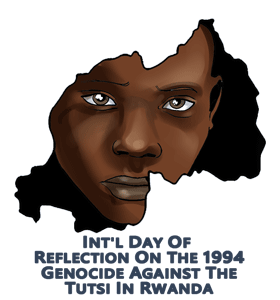

International Day of Reflection on the 1994 Genocide against the Tutsi in Rwanda
Quick Facts - ZA
| HashtagsCompiled on | #Genocide |
|---|---|
| Related Hashtags | #Kwibuka29, #Rwanda, #Kwibuka, #NeverAgain |
| 2024 Date | 7 April 2024 |
| 2025 Date | 7 April 2025 |
2024 Holidays & Dates
| South Africa & Common Holidays | ||
| Misc. & Int'l. Observances | ||
| Christian Holidays | ||
| Jewish Holidays | ||
| Muslim Holidays |
|
|
|
|
